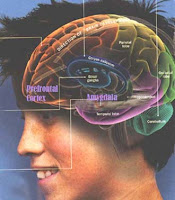 My class is reading and analyzing David Dobbs’s (2011) National Geographic article: “The New Science of the Teenage of Brain" (pgs 42-59). I found this text rather informative and intriguing.
My class is reading and analyzing David Dobbs’s (2011) National Geographic article: “The New Science of the Teenage of Brain" (pgs 42-59). I found this text rather informative and intriguing.Advancement in Teenage Brain Development
Going back 2300 years ago up until recently today, parents and society have had a negative spin on the teenage years. They ask the commonly asked question why do teens behave the way that they do? They have been caught up in observing and trying to understand their risk taking behavior, their need for novelty and social networking with peers, and their desire for excitement. Since the 1990’s, medicine and technology, married in a closely knitted relationship, has given inquiring minds more insight on the teenage brain, which goes beyond merely making observations and drawing conclusions.
Going back 2300 years ago up until recently today, parents and society have had a negative spin on the teenage years. They ask the commonly asked question why do teens behave the way that they do? They have been caught up in observing and trying to understand their risk taking behavior, their need for novelty and social networking with peers, and their desire for excitement. Since the 1990’s, medicine and technology, married in a closely knitted relationship, has given inquiring minds more insight on the teenage brain, which goes beyond merely making observations and drawing conclusions.
Teenage Brains are Being Rewired
Scientists discovered that the brain goes through a rewiring process between the ages of 12 and 25. During this lengthy time, there is a rewiring wave that begins in the back of the brain and moves towards the front. Teenage brains have the ability to reason like adults, but they are interested in risk taking, novelty, and excitement. This desire actually prepares teens to leave his or her safe world and go out into a world that is unknown. While teens are busy learning to take risks, even calculated ones, this may be why so many teens die taking risks or engaging in destructive risk taking behavior, such as drug abuse, which infects their adulthood.
Scientists discovered that the brain goes through a rewiring process between the ages of 12 and 25. During this lengthy time, there is a rewiring wave that begins in the back of the brain and moves towards the front. Teenage brains have the ability to reason like adults, but they are interested in risk taking, novelty, and excitement. This desire actually prepares teens to leave his or her safe world and go out into a world that is unknown. While teens are busy learning to take risks, even calculated ones, this may be why so many teens die taking risks or engaging in destructive risk taking behavior, such as drug abuse, which infects their adulthood.
The Adaptive-Adolescent Story
Scientist now accept the “adaptive-adolescent story” to explain both teen behavior and brain activity and development. Teens are undergoing a reorganization of their brain. Teens require their peers to make sense of their world and to take the final exit of risk: moving out. Parents can’t understand it, but they may remember how it was like. Thus, scientist say that teens can appreciate that their parents once lived in a teenage world and may listen to their parents if they stay somewhat connected but allow their teenager some independence.
Scientist now accept the “adaptive-adolescent story” to explain both teen behavior and brain activity and development. Teens are undergoing a reorganization of their brain. Teens require their peers to make sense of their world and to take the final exit of risk: moving out. Parents can’t understand it, but they may remember how it was like. Thus, scientist say that teens can appreciate that their parents once lived in a teenage world and may listen to their parents if they stay somewhat connected but allow their teenager some independence.
To read more about this fascinating topic go to:
http://ngm.nationalgeographic.com/2011/10/teenage-brains/dobbs-text
http://ngm.nationalgeographic.com/2011/10/teenage-brains/dobbs-text
*Photo taken from google images